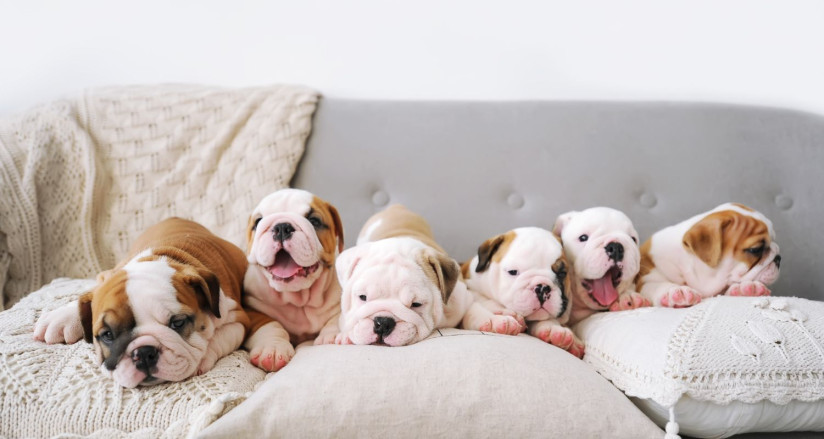Puppies are growing all the time – physically and mentally!
Taking care of their basic needs, understanding the reasons behind certain behaviors, and taking part in early training and socialization will help prevent frustration and ensure happy and healthy pups and parents at every stage of development.
Basic Needs
Every puppy needs high-quality food, separate food and water bowls, a secure place to sleep, a well-made collar and leash, and a few toys – not to mention lots of love and human company! Each of these items plays a role in your pup’s safety and comfort while easing the adjustment to your home. Here are some tips for puppy owners:
- Crates are natural dens that help your pup feel safe. Leave the door open as your puppy learns to trust its new environment.
- Avoid buying dozens of toys and treats, which can confuse a puppy about what they should and should not chew.
- Provide the same food the puppy is used to and make any switches slowly – different foods can cause an upset stomach.
- Familiar scents can make separation less traumatic. Rub a soft blanket against the mother and littermates; give very young puppies a hot water bottle or heat pad and a ticking clock (to simulate the mother’s warmth and heartbeat).
- Puppies need lots of love, play, and rest. Each puppy is different, so let your puppy tell you when it’s tired. Do not take a young puppy jogging or force them to play – these activities can cause overexertion or injury.
- Establish and stick to a schedule for meals, playtime, toileting, and more. Like human kids, puppies benefit from consistency. Deviations will happen, but the more predictability and routine, the happier you and your pup will be.
Potty Training
Potty training takes time and patience. Your puppy has not yet developed the awareness or physical capability to control its bodily functions like an adult dog and will need plentiful opportunities to toilet. Be proactive, stay diligent, and help your pup avoid mistakes.
What you can do:
- As a guideline, puppies can hold their bladders for the number of hours equal to their age in months plus one: for example, a two-month- old puppy can last about three hours.
- Confine your puppy to a specific room or small area while it is learning. Close doors and use baby gates (and/or a crate).
- Be sure to take your puppy out at regular intervals, as well as at these six critical times
- After waking up
- Before going to bed for the night
- After eating or drinking
- After/during excitement or exuberant play
- If frightened or nervous
- After the family arrives home
- Remain in the potty area as your puppy eliminates, lavishly praising it while it goes. A common mistake is to return inside too soon, only to experience an unexpected mess.
- Do not “correct” your puppy for soiling. Puppies may not associate correction methods with soiling and may become scared of being grabbed, or learn to find a hiding spot to toilet.
- If you do catch your puppy right before or in the act, quickly take it to its designated potty area and praise it as it continues to potty. If you find a mess after the fact, all you can do is clean it up. Just be sure you don’t use any ammonia-based products for cleanup: while popular, they may be toxic for your pets.
Chewing
Your puppy’s mouth is an exploratory tool. Chewing is a natural function of your dog’s development, a source of stress release, and, if effectively managed, can be a way to prevent the onset of destructive behaviors, including separation anxiety.
We recommend:
- Providing appropriately sized chew toys.
- Introducing safe chew articles while your dog is in its den area, to create positive associations and allow you to observe their behavior.
- Giving your pup a toy to chew on before its frequent rest periods to help it fall asleep more quickly.
Sleep
Puppies need sleep – lots of sleep. In fact, they need 18-20 hours of sleep over a 24-hour period while they are young! Crates provide a safe haven for dogs and allow pet parents to relax or complete tasks that are impossible while watching a puppy. They also help with training by limiting your puppy’s mistakes to times when you are present and prepared to teach.
How to help:
- Ensure the crate is only large enough for the puppy to stand up and turn around – any larger and it may soil a corner where it does not sleep. Built-in dividers can help if needed.
- There will be crying the first few nights. Check to make sure your pup is safe and not stuck or hurt; talk in a normal (not soft or high-pitched) tone to avoid reinforcing this behavior.
- You will have to get up a couple of times during the night to let your puppy out to toilet.
- Never use crates as punishment.
- Keep the crate near the family as much as possible so your puppy doesn’t feel ostracized.
- Some separation is healthy, however, so avoid bringing the crate into your bedroom at night to prevent future episodes of separation anxiety.
Related Articles
Looking for additional information? Take a look at these related articles:
